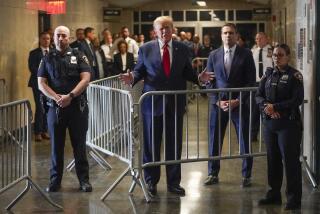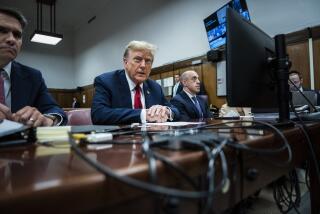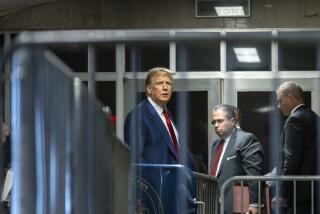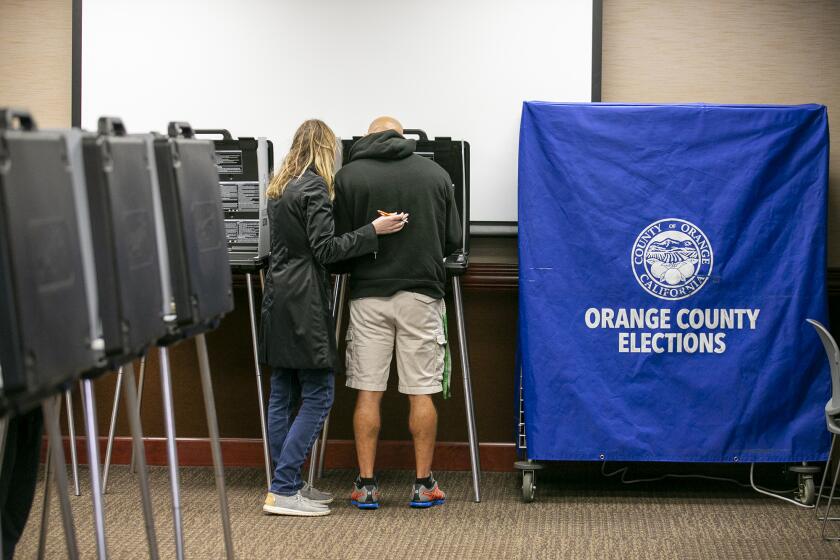Manafort trial moves to final phase as defense rests without presenting witnesses
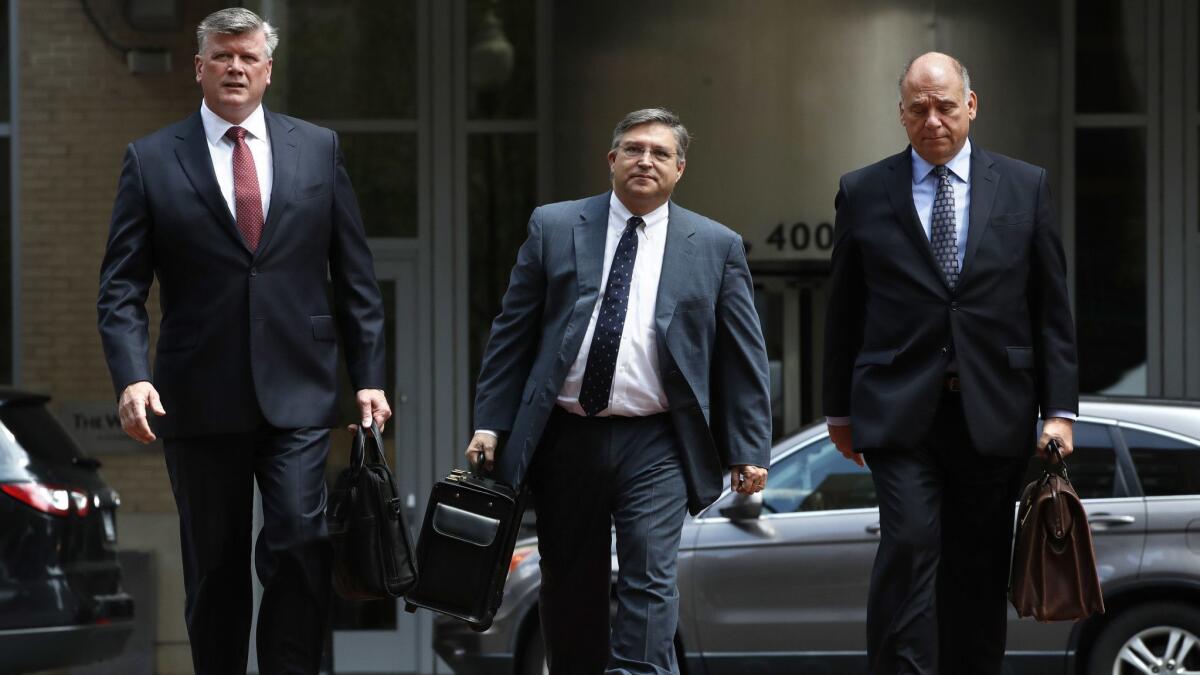
Paul Manafort’s lawyers rested their case Tuesday without putting him or any other witnesses on the stand, gambling that federal prosecutors have not convinced the jury that President Trump’s former campaign chairman is guilty of tax evasion and bank fraud.
Lawyers for the two sides are expected to deliver their closing arguments on Wednesday, meaning the high-profile criminal case — the first trial on charges brought by special counsel Robert S. Mueller III — could quickly reach the jury and a verdict.
Manafort’s team disclosed their decision after U.S. District Judge T.S. Ellis III denied a defense motion to dismiss the 18 criminal charges against Manafort, a former Republican operative and influential lobbyist. Such motions are routinely filed, but rarely granted.
Moments later, Manafort addressed the court for the first time since the trial opened 11 days ago when the judge asked him to confirm that he doesn’t plan to testify.
“No, sir,” Manafort replied, standing with his hands resting on the podium.
Solomon Wisenberg, a white-collar defense attorney who worked for independent counsel Kenneth Starr during the investigation of the Clinton White House in the late 1990s, said he wasn’t surprised that Manafort’s lawyers decided not to call any witnesses despite the voluminous evidence against him.
Last week, Manafort’s lawyers hammered at the credibility of the government’s star witness, Richard Gates, accusing him of being a liar, an embezzler and an adulterer. It remains to be seen whether that’s enough to convince jurors that prosecutors relied on shaky evidence and did not provide proof beyond a reasonable doubt, the legal standard for conviction.
But Wisenberg said the defense’s best chance for an acquittal may be if one of the 12 jurors — six men and six women — decides to support Manafort for political reasons. “Their only hope of winning is if one or more people on the jury says, ‘I like Trump, I don’t like Mueller,’” he said.
Harry Litman, a University of California law professor and former federal prosecutor, said defense lawyers often call a handful of witnesses to chip away at bits of the government’s case. But Manafort’s team may be betting that they stand a better chance if they strike a confident stance in their closing argument.
They are likely to argue to the jury that “the government hasn’t landed a glove on us, so there was no reason to put on a defense,” Litman said.
Shanlon Wu, a white-collar defense lawyer who previously represented Gates, said it’s not unusual for defense attorneys to decline to call witnesses. The decision leaves the burden of proof squarely with prosecutors.
“It’s a sign of some confidence on the Manafort’s team part that they did enough with just the cross-examination,” Wu said. “They feel they’ve done what they needed to do.”
Andrew McBride, a former federal prosecutor in the Eastern District of Virginia, said he was surprised by the defense’s decision, however.
“I would have expected some witnesses on how Manafort trusted and relied upon Gates and gave him independent control of his finances,” he said. “Now the defense is limited to arguing reasonable doubt. Tough road to hoe with two weeks’ worth of damaging testimony.”
The trial has been marked by unusual exchanges between prosecutors and the judge, who repeatedly chastised them or ordered them to hurry up. Prosecutors, in turn, urged Ellis not to misstate facts or law in front of the jury.
They twice filed formal motions asking the judge to tell the jury to ignore a prior outburst. He did so once, telling the jury last Thursday that he was “probably wrong” and to disregard his comments about a government witness.
Manafort, 69, has pleaded not guilty to 18 charges connected to his work advising Ukraine’s former president, Viktor Yanukovich, and his political party.
They include five counts of filing false tax returns between 2010 and 2014, four counts of failing to report foreign bank accounts, and nine counts of bank fraud and conspiracies to commit bank fraud.
Follow the latest news of the Trump administration on Essential Washington »
If convicted, Manafort could spend the rest of his life in prison. Even if he is acquitted, he faces a second, related trial next month in Washington. In that case, he has pleaded not guilty to money laundering, failing to register as a foreign agent and attempted obstruction of justice.
During the trial in Alexandria, prosecutors outlined an elaborate scheme, arguing that Manafort used offshore bank accounts to illegally shield millions of dollars from U.S. taxes over a period of years, sometimes wiring the money directly to American stores to purchase expensive clothing, cars, antiques and home renovations.
After Yanukovich was ousted from power in 2014 and Manafort’s lucrative work in Ukraine dried up, prosecutors said, he turned to bank fraud to finance his extravagant lifestyle, lying on applications for bank loans and mortgages on multiple homes.
Some of the alleged crimes overlapped with Manafort’s five months working for the Trump campaign in 2016, prosecutors said. None of the evidence suggested that Manafort had conspired with Russian intelligence to help Trump win the White House, the primary focus of the Mueller investigation.
Prosecutors called more than two dozen witnesses, but they relied most heavily on Gates, Manafort’s former deputy at his consulting firm and on the Trump campaign, who testified for 2 ½ days. Defense lawyers, in turn, did their best to convince jurors he could not be trusted.
Gates was initially charged in the case, but pleaded guilty to conspiracy and lying to investigators in February. He agreed to testify as long as prosecutors didn’t oppose his lawyer’s request for probation when he’s eventually sentenced.
He testified that Manafort often asked him to present false information to accountants and banks to help illegally reduce his tax bill or obtain loans through fraud.
But defense lawyers highlighted his admission that he initially lied to the special counsel, embezzled hundreds of thousands of dollars from Manafort’s company, and had at least one extramarital affair. They also suggested he had stolen from Trump’s inaugural committee, which Gates did not deny outright.
One of the prosecution’s final witnesses was James Brennan, a vice president at Chicago-based Federal Savings Bank.
He testified that Manafort’s finances appeared on shaky ground in 2016 when he applied for two loans worth $16 million, but the bank’s chief executive, Stephen Calk, overruled those concerns and approved the loans.
Previous testimony indicated that Calk hoped to land a Cabinet-level position in the Trump administration, and Manafort pushed his name as a potential Army secretary after the election. Calk ultimately did not join the administration.
Twitter: @chrismegerian
UPDATES:
3:20 p.m.: This article was updated with analysis from outside lawyers.
9:30 a.m.: This article was updated to say the defense had rested without presenting witnesses.
This article was originally published at 3 a.m.
More to Read
Get the L.A. Times Politics newsletter
Deeply reported insights into legislation, politics and policy from Sacramento, Washington and beyond. In your inbox three times per week.
You may occasionally receive promotional content from the Los Angeles Times.
